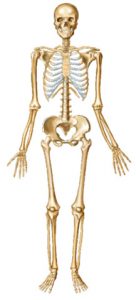 MRONJ (Medication-related osteonecrosis of the jaw) and Bisphosphonates
MRONJ (Medication-related osteonecrosis of the jaw) and Bisphosphonates
Bisphosphonates (BPs) are a class of drugs used to prevent the loss of bone mass. Oral BPs, including Fosamax, Actonel, and Boniva, are used to help prevent and treat osteoporosis, a disease where decreased bone strength increases the risk of broken bones. Evidence shows that BPs can reduce the risk of bone breakdown and fracture. IV BPs, including Aredia, Zometa, and Reclast, are anti-resorptive medications used to manage cancer-related conditions. Bone undergoes constant turnover and is kept in balance by osteoblasts (bone forming cells) and osteoclasts (bone destroying cells). BPs inhibit osteoclastic bone resorption and remodeling by inhibiting osteoclastic differentiation and increasing apoptosis (cell death).
Osteonecrosis (bone death) of the jaw (ONJ) occurs primarily within the alveolar bone of the upper (maxilla) and lower (mandible) jaw. An increased remodeling rate in the jaws may explain the differential predisposition to ONJ compared with other bones in the body. In other words, BPs have a more pronounced effect in the jaw bones than in other bones because the jaw bones are inhibited more from remodeling at their normal greater rate. When the jaws undergo trauma, such as by tooth extraction or implant placement, the bone may not remodel and heal properly due to the BPs, resulting in osteonecrosis.
The reported risk of developing MRONJ in patients taking oral BPs is about 0.5% after tooth extraction or implant placement. The risk increases to 2-15% in patients taking IV BPs. MRONJ most often occurs just in the mandible, but sometimes occurs just in the maxilla or both. BPs have very long-lasting effects (many years) because of their prolonged embedding in the bone tissue. Studies have shown that the incidence of ONJ decreased by 50% in patients who were screened and received preventive dental care before initiating BP drug therapy. The key is to identify and treat acute and potential infections first.
There continues to be an ongoing controversy regarding a BP “drug holiday” for patients who need extractions or bone surgery after already taking these medications. A consultation between treating doctors is indicated for each individual patient. It has been noted that the risk of MRONJ is greater for IV BPs than for oral BPs and that the risk of MRONJ increases with oral BPs when taken for more than 4 years.
In patients with established MRONJ, the primary goals are to eliminate pain, control infection and minimize the progression of bone necrosis. Regardless of the disease stage, areas of necrotic bone should be removed and recontoured to optimize soft tissue healing. The extraction of symptomatic teeth within exposed necrotic bone is recommended. If your physician decides that BPs are needed to treat any health conditions you may have, be sure to also inform and consult with your dentist to make sure you have any and all necessary dental treatment completed first. Here, and ounce of prevention is certainly worth a pound of cure!
I wish all our patients the very best in their oral and overall health.
Dr Swain


